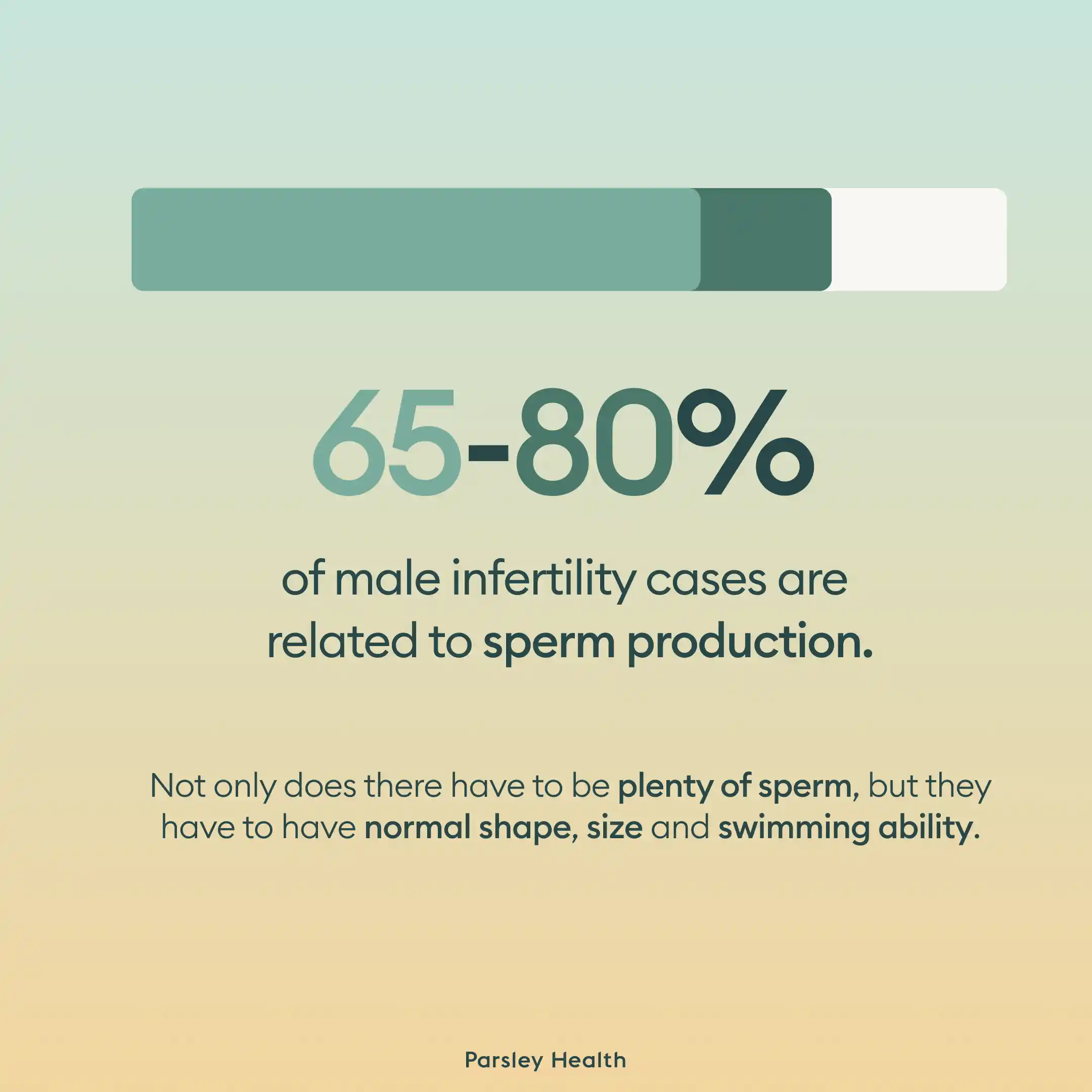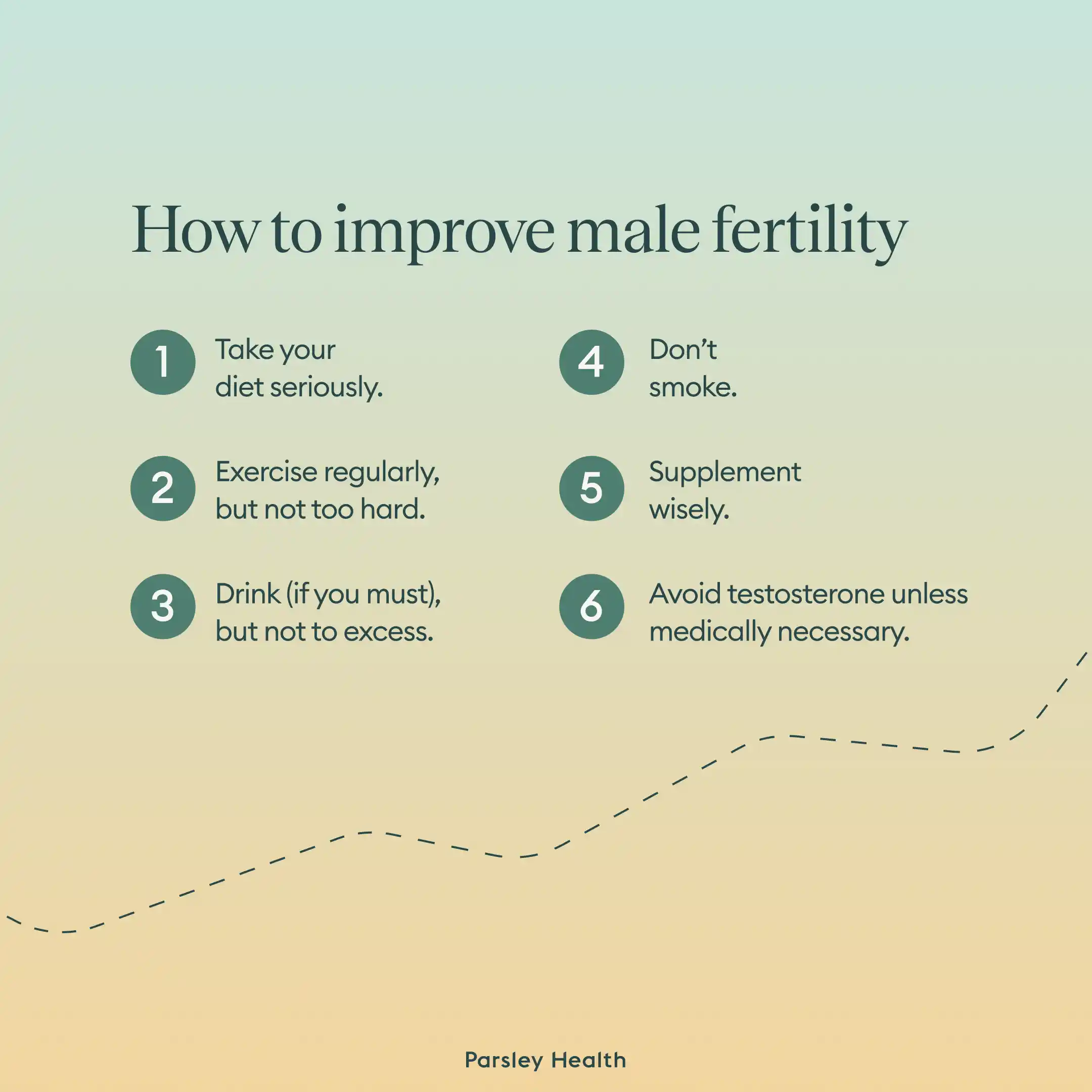If you're assigned male at birth and considering starting a family, you may be curious how to increase your fertility and sperm count.
Although sperm counts have declined on average, the quality, rather than the quantity is what matters when it comes to fertility. The male body makes millions of sperm, and it only takes one to do the job.
Unfortunately, the quality of sperm, which typically declines with age, may be decreasing in much younger people assigned male these days.
Male infertility is thought to be solely responsible in 20 percent of infertility cases but may be a factor in as much as 40 percent. Here's what you can do.
Evaluating male fertility
If you are having difficulty conceiving after a full year, you may want to consider having your fertility evaluated.
The evaluation for male reproductive health is quite simple. You will likely be required to provide a sperm sample, undergo some bloodwork, and answer questions about your lifestyle.

As much as 65 to 80 percent of male infertility cases are related to sperm production. Sperm need to be plentiful, but they also need to be of normal shape and size and have adequate swimming ability.
Issues with sperm production can be inherent at birth or acquired due to things like infections or exposure to toxins.
Diet and low testosterone production associated with having obesity are also common factors.
Fertility as a marker of health
Semen analysis can be a helpful biomarker of health in general. One large study found that men with abnormal semen parameters had an increased mortality rate in the years following an infertility evaluation.
How to improve male fertility
At Parsley Health, we frequently work with members who are interested in family planning. The process typically starts months before conception, if not sooner. Looking to boost your fertility? Here’s where to start.

1. Take your diet seriously.
You may be able to boost semen quality by improving your diet. Diets rich in processed meat, soy foods, potatoes, full-fat dairy, cheese, coffee, alcohol, sugar-sweetened beverages and sweets may be detrimental to sperm quality, research shows.
Nutrients associated with better semen quality
- Folate
- Lycopene
- Omega-3 fatty acids
- Selenium
- Vitamin C
- Vitamin D
- Vitamin E
- Zinc
Nutrients associated with low semen quality
2. Exercise regularly, but not too hard.
Exercise in general seems to improve sperm health, but research has shown that the type of exercise you do matters.
When researchers compared moderate intensity continuous training, high intensity continuous training, and high intensity interval training, moderate intensity training came out on top.
In fact, high loads of endurance training may interfere with fertility. Keep moving, but keep your workouts lighter to optimize sperm health.
If you enjoy endurance or HIIT training, an expert such as a Parsley Health coach can help you create an exercise plan that works for you.
3. Drink (if you must), but not to excess.
Avoid excessive amounts of alcohol and caffeine, which are known to negatively impact fertility and sperm production.
Drink both only in moderation which, for most, means limiting intake to one to two drinks of either per day.
4. Don’t smoke.
Numerous studies suggest that cigarette smoking is associated with lower semen volumes, sperm counts, and reduced percentages of motile sperm.
If you quit smoking, you can optimize your chances of conceiving. Most evidence suggests that chronic, regular, and especially heavy cannabis use is also associated with reduced sperm number and function.
5. Supplement wisely.
Some supplements, when used appropriately, may have mild to modest improvements in both sperm quantity and quality. These include the following.
Be sure to work with a seasoned health clinician with a working scientific knowledge of these and other agents to determine which may be appropriate for you and at what dosage.
6. Avoid Testosterone Unless Medically Necessary.
The use of testosterone supplementation should not be taken lightly. Young people assigned male at birth can become infertile due to unnecessary or inappropriate use of testosterone.
Testosterone supplementation can cause atrophy in the testicles and subsequently reduce sperm counts. In many cases, reversal of the process is difficult or impossible after prolonged use.
7. Maintain a healthy body weight.
Having obesity can also contribute to infertility. An increased level of adipose tissue (fat) is associated with worsened metabolic health, which can cause hormonal imbalances and impact sperm quantity and quality. Having obesity may also have long-term impacts on your future children.
Obesity is a complex chronic condition. While changing lifestyle factors can help, you may need additional support from an obesity medicine specialist and more.
Final thoughts on male infertility
Issues with fertility are not uncommon, but they can often be corrected without invasive or expensive interventions.
Typically a fundamental and personalized approach to health, including getting quality sleep and reducing stress, will boost your well-being as well as your sexual and reproductive fitness.
Parsley Health physicians and coaches specialize in curating such programs for you. Reach out for a free consultation.





